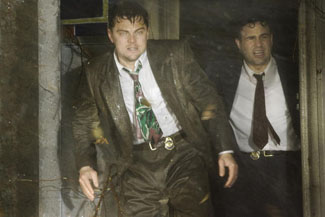Movie Review: Shutter Island
By Matthew Huntley
February 25, 2010
Shutter Island is a dark and atmospheric tale with a provocative twist. I hesitate to write that last word because I don't want you thinking the film's efficacy relies solely on its final revelation. It validates itself by being a complex, patient and character-driven horror-thriller that refrains from employing cheap tricks, sudden shrieks, loud crescendos, or the closing of a medicine cabinet door just to reveal someone in the reflection. Given the reputation of the genre, we should expect less, but because the director is Martin Scorsese, we get more.
Based on the novel by Dennis Lehane, the film sets itself up as a classic detective story but gradually becomes more psychological than procedural. Leonardo DiCaprio is Edward "Teddy" Daniels, a federal marshal from Boston who's prone to sea sickness and a short temper. As the film opens, he and his new partner, Chuck (Mark Ruffalo), are on a ferry boat to Shutter Island, a brooding land mass hidden by fog and mist.
It's not a coincidence Scorsese introduces us to the island the same way Stanley Kubrick first revealed the ominous hotel in The Shining, complete with a heavy, bass chord to accompany the unsettling imagery. Occupying Shutter Island is a prison for the criminally insane, or as the prideful Dr. Cawley (Ben Kingsley) would say, a hospital for sick patients.
Teddy and Chuck have been called in to investigate the disappearance of a prisoner, a woman named Rachel (Emily Mortimer), who allegedly murdered her three children but believes they're still alive. After speaking with Cawley and his employees, Teddy has reason to believe he's being kept in the dark about what really goes on at this institution. What really takes place in the lighthouse or the mysterious C ward, where no one is allowed to go?
During his investigation, Teddy has hallucinations of his dead wife (Michelle Williams) and grows increasingly restless and paranoid the prison staff is luring him into their sinister scheme, whatever that may be. He also believes the man responsible for his wife's untimely death is being kept here and is desperate to find him, even though his final plans don't involve revenge.
Any further plot description, I cannot give you. What I can say is the plot gets revealed with such attention to detail that it's not the twist we care about so much as the truth, and not just for our sake, but for the characters'. I haven't read the novel, but if it's anything like Lehane's other work, it's an in-depth page turner that doesn't rely on gimmicks or sensationalism but on psychosis and human behavior. Scorsese tells the film version the same way and makes good use of DiCaprio, whose passion and energy keep us intrigued with everything Teddy uncovers.
The film is brilliant in the way it draws us into its ghastly world. Dante Ferretti's production design and Robert Richardson's cinematography are fascinating and envelop us in a bizarre and twisted environment that's even more unsettling because it looks like it could actually exist. The dilapidated buildings, the winding staircases, the wide open spaces, the hidden cemetery in the woods - these must have been a production design team's dream come true. And yet, attention stays focused on the investigation and Scorsese doesn't let the style overshadow the story. Despite the terrific sets, we still find ourselves listening to the dialogue.
If the film has a flaw, it's that it lacks an emotional hook. As interested as I was in the plot and Teddy's persistence to find the truth, I didn't care about him outside his role as detective. He didn't become fully human to me. Perhaps if, along with the flashbacks and hallucinations of his wife, we were given a few scenes that illustrated the couple's happiness before she died. Everything about Teddy is dark, grim and depressing, which is effective, but if we had an idea of what once made him smile, the flashbacks and his endurance might have had more meaning.
Some critics believe Martin Scorsese shouldn't take on a project like Shutter Island. They claim it's too "mainstream" for such a gifted director. But I think we need directors like Scorsese to bring quality back to mainstream cinema. Audiences have gotten too comfortable with mediocre, widespread films, especially from the horror genre. True, Shutter Island isn't very inspired, and its underlying premise is not wholly original, but it's exceptionally well made and entertaining. Is it one of Scorsese's best? No, because the confines of the genre, which Scorsese doesn't seem willing to transcend this time, prevent that. Even so, we can consider this one of the better films so far this year.
|
|
|
|




